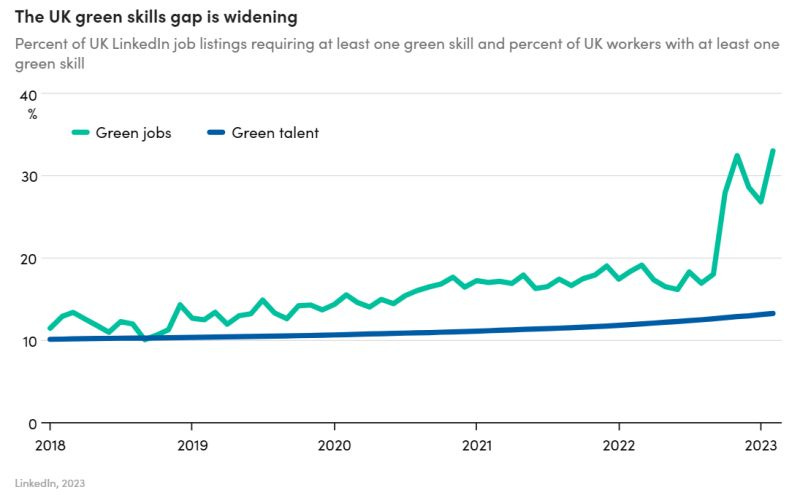This week is UK battery research institute The Faraday Institution's Careers Week. If, like me, you are often reflecting on how best to use your time in a world on fire, where disinformation reigns and metrics seem to be consistently moving in the wrong direction, then the excellent news is that there are lots of ways to roll up your sleeves. In fact, we need you quite a lot. 🔋
Throughout history technologies have revolutionised human life and economies, from the printing press to the invention of the car, and the answer here in 2025 to pivoting our whole economy away from fossil fuels is no different.
The technology needed for this next era of human life is already here with solar, wind, and battery technology getting cheaper and cheaper. Something we are lacking is skilled people.

In the UK it is estimated that there is a skills gap of 200,000 people across all ‘green’ jobs. This is known as the ‘Green Skills Gap’, better described as the shortage of workers that are needed to fill incoming jobs created by the green transition. This includes everything from heat pump engineers, to building insulation assessors, to operators for battery manufacturing lines. These careers can also offer a path for retrained workers from industries like oil and gas where jobs are disappearing.
The green skills gap is far from a UK only problem, with the demand for ‘green skills’ rising 11.6% in 2023 to 2024 across Europe, with appropriately skilled people only rising by 5.6%.
The average salary graduate salary is £26,023, and for STEM jobs (scientists, engineers, anything working in science and technology) it is £30,973, depending on exact sources. In the UK, the average starting salary for a graduate Management Consultant is £34,383 and a graduate Investment Banking Analyst is £56,853. We see a similar problem in the US with about 45% of graduates from Harvard go straight into finance or consulting.
However, salary is not the only challenge that green, and particularly battery, jobs face. One of the challenges of STEM careers is the opaque nature of careers in science. What does it mean to be an ‘scientist’ or whatever the job role might call itself? The Faraday Institution has produced a resource to help do that.
It aims to:
…provide an overview of the diverse battery careers available to you, what they involve and practical insights towards developing your career. The battery industry, characterised by its interdisciplinary nature, offers a plethora of roles ranging from research and development to manufacturing and policy-making.
I really liked the way the different interviews capture different perspectives on finding meaning and creating positive impact in the world from within batteries. So I’ve tried to capture a broad sample of why different people do what they do.
Whilst all the examples in this article are very academic, there are other entry points to energy storage such as new initiatives like the Battery Manufacturing Skills Pathway qualitifations aimed at upskilling the next generation of UK battery factory operators. Energy storage also needs accountants, lawyers and good coffee.
Academia
Academics in general pursue new knowledge. They’re found in universities or research institutes. They share the knowledge that they acquire through writing papers, giving talks at conferences, and applying for patents and starting companies.
An interview with David Howey, Professor at Oxford, illustrates his thoughts around how he thinks about impact for research:
Usually, when people are asked about their career aspirations, they reply on the scale of decades, but I’m conscious of accelerating climate change and wonder how I can have the most impact in the shortest time. That’s hard to address in academia, which tends to work over long timescales. For example, early battery research began in the 1970s, and the commercialisation of lithium-ion batteries was in the 1990s. Twenty years from now will be too late to start making impacts on climate change. So, I’m increasingly thinking about how we can measure our immediate impact – if we develop a new algorithm that can control a battery, how can I get that into the most impactful applications as quickly as possible? …
Finally, I’ve been considering how we, as academics, can show climate-aware leadership in our day-to-day activities. For example, I’m organising a conference in Oxford on battery modelling, which I’m keen to do as a hybrid event to avoid unnecessary flights. It’s a small example, but considering our position to influence others, these choices are important.
He also mentions about his role as a mentor to his students, and being part of spinning out a company from knowledge developed in his group:
One highlight that comes to mind is our spin-out company Brill Power, a company developing intelligent battery management and control technology to increase the lifetime and reliability of lithium-ion battery packs. I am immensely proud of what the team at Brill Power has achieved. It was named Top Battery Company 2022 at Energy Tech Challengers and raised $10.5 million in funding in July 2022. On the personal side, I’m very proud that some of my former PhD students lead the company. I take immense satisfaction in interacting with great people to do research and seeing how students develop and learn in my group, and have gone on to do exciting things. As a senior academic, I recognise my role in providing training as well as research. With that in mind, I try to create a group atmosphere that is collaborative, inclusive, and relaxed so people enjoy coming to work and have the freedom to be creative.
Start ups
Start up companies, like Brill Power mentioned above, are one way that knowledge and discoveries are translated into impact. In an interview with Dr Ian Campbell, CEO at Breathe Battery Technologies which span out of Imperial College London, he describes the motivation and challenges he faces:
Our name is a wordplay - we dream that one day everyone will breathe clean air, so we are working to make batteries better so we can solve the big issues of air pollution, electronic waste and the consumable nature of batteries.
Scaling the team and ensuring adequate financing are always obstacles. Recruiting the right people is challenging too. In the UK we simply aren't producing battery engineers at the pace required to meet the regulatory drivers for electrification, so it's an intensely competitive market for hiring.
This really tangibly highlights the green skills gap mentioned above. Ian also demonstrates a very can-do attitude:
When issues pop up, I view them as chances to get creative with solutions that keep us moving forward at full speed. Embracing setbacks with a positive attitude helps us continually improve and stay ahead in a competitive environment.
I'm passionate about doing things the right way. I strive to lead from the front, motivate our team to push boundaries, and redefine what's possible in battery technology every day.
R&D
The R&D departments of companies, whether large or start up, are the engineer rooms of innovation. Scientists will have to solve specific problems within a budget or limited to certain materials. Dr Laura Wheatcroft describes what this is like in one interview. Her motivations are very firmly rooted in being intellectually stretched in her current role at Nyobolt:
It ticks my fast-paced and interesting boxes perfectly. It’s one of the few UK companies that has an entire battery ecosystem in one company: R&D on battery chemistries, powder manufacturing, cell design, pack engineering, battery management systems and power electronics. It gives me a unique opportunity to learn about all those areas while focusing on one. I work with a cell development team from the US with an amazing amount of experience. I’ve been on a trip to Japan to look at equipment we might potentially buy. I’ve been on trips to manufactures to see cell manufacture at large scale. There’s so much more to battery engineering than you get to see from academia.
BESS Asset Management
Just as important as R&D roles are people that keep the batteries, and our world, running. One such example is Dr Pooja Vadhva, who is a Technical Asset Manager for Gresham House. She describes the real world impact of this kind of role:
Working as a Technical BESS Asset Manager, I've found that deep battery knowledge is incredibly useful—it helps me diagnose issues quickly and implement solutions that maximise asset availability, boosting both investor confidence and grid reliability. As renewables ramp up, battery storage plays a vital role in stabilising the grid, enabling clean electricity, supporting frequency response, and participating in wholesale trading to help lower consumer bills. Recent events in Spain have highlighted the growing pressure on grids during periods of high renewable generation—underscoring the need for well-managed storage to maintain stability.
What many battery PhDs and engineers don’t realise is that roles in asset management offer the chance to step beyond purely technical work and build commercial and financial expertise. The UK has led the way in battery deployment, and now we’re seeing similar momentum across Europe as the renewable build-out accelerates. It’s an exciting, high-impact career path where battery expertise is needed.
I hope this collection has been interesting, and perhaps even thought provoking. Have a look at the Faraday Institution Batter career portfolio for more general tips, advice and training opportunities. There is a role for everyone in the climate and energy storage space, we need all hands on deck!
🌞 Thanks for reading!
📧 For tips, feedback, or inquiries - reach out
📣 For newsletter sponsorships - click here







